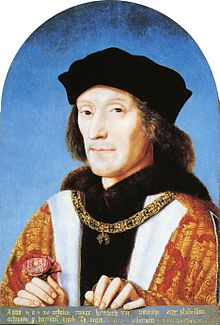Henry of Richmond
| Henry VII | |
|---|---|

Henry holding a rose and wearing the collar of the Order of the Golden Fleece, by unknown artist, 1505
|
|
| King of England (more...) | |
| Reign | 22 August 1485 – 21 April 1509 |
| Coronation | 30 October 1485 |
| Predecessor | Richard III |
| Successor | Henry VIII |
| Born |
28 January 1457 Pembroke Castle, Pembrokeshire, Wales |
| Died | 21 April 1509 (aged 52) Richmond Palace, Surrey, England |
| Burial | 11 May 1509 Westminster Abbey, London |
| Spouse | Elizabeth of York (m. 1486; d. 1503) |
| Issue more... |
Arthur, Prince of Wales Margaret, Queen of Scots Henry VIII, King of England Mary, Queen of France |
| House | Tudor |
| Father | Edmund Tudor, 1st Earl of Richmond |
| Mother | Lady Margaret Beaufort |
| Religion | Roman Catholic |
| Signature |  |
Henry VII (Welsh: Harri Tudur; 28 January 1457 – 21 April 1509) was King of England and Lord of Ireland from seizing the crown on 22 August 1485 until his death on 21 April 1509, and the first monarch of the House of Tudor.
Henry won the throne when his forces defeated King Richard III at the Battle of Bosworth Field, the culmination of the Wars of the Roses. Henry was the last king of England to win his throne on the field of battle. He cemented his claim by marrying Elizabeth of York, daughter of Edward IV and niece of Richard III. Henry was successful in restoring the power and stability of the English monarchy after the civil war, and after a reign of nearly 24 years, he was peacefully succeeded by his son, Henry VIII.
Henry can also be credited with a number of administrative, economic and diplomatic initiatives. He paid very close attention to detail, and instead of spending lavishly he concentrated on raising new revenues. His new taxes were unpopular and when Henry VIII succeeded him he executed his two most hated tax collectors.
His supportive stance of the islands' wool industry and stand off with the Low Countries had long lasting benefits to all the British Isles economy. However, the capriciousness and lack of due process that indebted many would tarnish his legacy and were soon ended upon Henry VII's death, after a commission revealed widespread abuses. According to the contemporary historian Polydore Vergil, simple "greed" underscored the means by which royal control was over-asserted in Henry's final years.
Henry VII was born at Pembroke Castle on 28 January 1457 to Margaret Beaufort, Countess of Richmond. His father, Edmund Tudor, 1st Earl of Richmond, died three months before his birth.
...
Wikipedia
